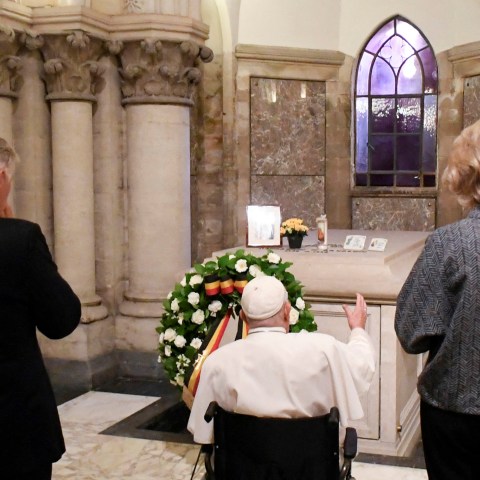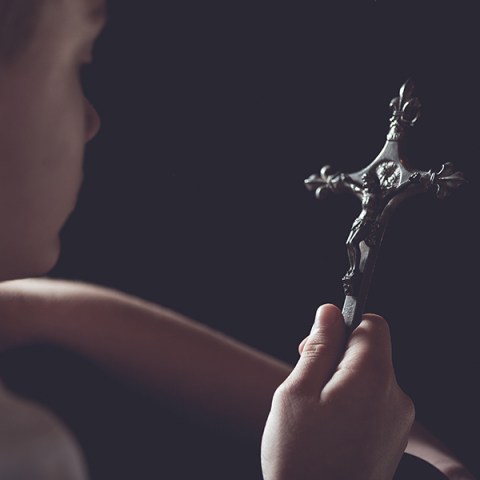“Society is sad and grey because it has no children”
Children are a gift for humanity who can teach adults to be spontaneous and authentic, and yet they are the “great excluded ones” who are often not allowed to be born, Pope Francis has said.
Speaking to pilgrims attending his weekly general audience in St. Peter’s Square today, the Holy Father said children are a “treasure for humanity” who “remind us that we are always children.”
“Children bring life, joy, hope, and also trouble. But, this is life,” the Pope said. But he added that these problems are “better than a society that is sad and grey because it has no children.”
“When we see the birthrate of a society reach just one percent, we can say that this society is sad and grey because it has no children,” he said.
The Pope said these words on the day in which he approved the canonization of the parents of St. Thérèse of the Child Jesus, the 19th century French Carmelite saint and doctor of the Church renowned for her “little way” of spiritual childhood through which she has taught countless people the way to God.
Here below we publish an English translation of the Pope’s full address.
***
Dear brothers and sisters,
Good morning. Having looked at the various figures in the family — mother, father, sons and daughters, siblings, grandparents — I would like to conclude this first group of catecheses on the family by speaking about children. I will do so in two stages: today I will reflect on the great gift which children are for humanity — it is true they are a great gift for humanity, but they are also the great excluded ones, because they are not allowed to be born — and next time I will reflect on several wounds which regrettably harm childhood.
The great many children who I met during my last journey to Asia come to mind: full of life, of enthusiasm. On the other hand, I see that in the world many of them live in undignified conditions. In fact, a society can be judged by the way it treats its children. Not only morally, but also sociologically, if it is a free society or a society enslaved to international interests.
First, children remind us that all of us, in the early years of life, were totally dependent on the care and kindness of others. And the Son of God did not spare himself this step. It is the mystery we contemplate each year at Christmas. The crèche is the icon which communicates this reality to us in the most simple and direct way. But it’s curious: God has no difficulty in being understood by children, and the children have no trouble understanding God. It’s not by chance that, in the Gospel, there are very beautiful and strong words of Jesus about “little ones”. This term “little ones” indicates all people who depend on the help of others, and especially children. For example, Jesus said: ‘I praise you, Father, Lord of heaven and earth, because you have hidden these things from the wise and learned, and have revealed them to the little ones” (Mt 11:25). And again: “See that you do not despise one of these little ones, for I say to you that their angels in heaven always see the face of my Father who is in heaven” (Mt 18:10).
Therefore, children are in themselves a treasure for humanity and for the Church, because they constantly remind us of the necessary condition for entering the kingdom of God: that of not considering ourselves self-sufficient but rather in need of help, love, and forgiveness. And we all need help, love and forgiveness.
Children remind us of another beautiful thing. They remind us that we are always children. Even if one becomes an adult, or elderly; even if one becomes a parent or occupies a position of responsibility, beneath all this is the identity of the child. We are all children. And that always brings us back to the fact that we have not given ourselves life, but rather we have received it. The great gift of life is the first gift we have received. Sometimes in life we risk forgetting this, as if we were the masters of our existence, whereas we are radically dependent. In fact, it is a great joy to hear that in every age, in every situation, in every walk of life, we remain children. This is the main message that children give us by their presence: by their presence alone, they remind us that all of us and each one of us are children.
But there are so many gifts, so many riches that children bring to humanity. I will mention just a few.
They bring their way of seeing reality with a trusting and pure gaze. A child has a spontaneous confidence in his mommy and daddy; and he has a spontaneous trust in God, in Jesus, and in Our Lady. At the same time, their inner gaze is pure, not yet tainted by malice, by duplicity, by the “scales” of life which harden their hearts. We know that children have original sin, that they are prone to forms of selfishness, but they retain an interior purity and simplicity.
But children are not diplomats: they say what they feel, they say what they see, directly. And many times they challenge their parents, saying in front of other people: “I don’t like this because it’s ugly.” Children say what they see. They are not duplicitous. They have not yet learned the science of duplicity that we adults unfortunately have learned.
Children also — in their inner simplicity — bring with them the ability to receive and offer warmth and tenderness. Tenderness means having a heart “of flesh” and not “of stone”, as the Bible says (cf. Ez 36:26). Tenderness is also poetry: it is “feeling” things and events, not treating them as mere objects, only to use, because they they serve us.
Children have the ability to smile and cry. Some children smile when I reach out to embrace them. Others see me dressed in white and think I’m a doctor coming to give him a vaccine, and they start crying spontaneously! That’s the way children are: they smile and cry, two things that are “blocked” in us who are big. We are not longer able.… So often our smile becomes a cardboard smile, something lifeless, like a clown. Children smile spontaneously and cry spontaneously. It always depends on their heart, and often our heart freezes and loses this ability to smile and cry. And so children can teach us how to smile and cry again. But we have to ask ourselves: Do I smile spontaneously, with freshness and with love, or is my smile artificial? Do I still cry, or have I lost the ability to cry? Two very human issues that children teach us.
For all these reasons, Jesus invites his disciples to “become like children”, since “to such as these belongs the kingdom of God” (cf. Mt 18:3; Mk 10:14).
Dear brothers and sisters, children bring life, joy, hope, and also trouble. But, this is life. Certainly they also bring concerns and sometimes many problems, but a society with these concerns and these problems is better than a society that is sad and grey because it has no children! And when we see the birthrate of a society reach just one percent, we can say that this society is sad and grey because it has no children.
Diane Montagna is Rome correspondent for Aleteia’s English edition.








